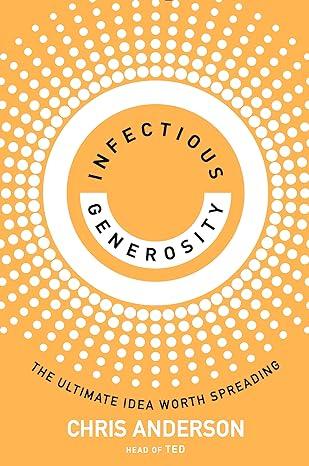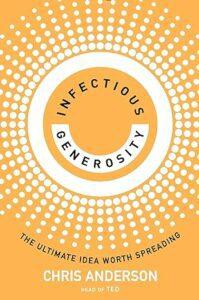Infectious Generosity
The Ultimate Idea Worth Spreading


Chris Anderson is the publisher who brought TED Talks to the world. He started out as a journalist and then magazine publisher in the 1980s. He built his Business 2.0 and computer magazine business up, eventually employing over 2000 people and sold it in 1999, which brought him to create the Sapling Foundation that bought the little-known TED Conference. Leveraging the new world of the internet and creating TED Talks, a force for good that everyone reading Ideas for Leaders will already be familiar with.
When Chris Anderson left his computer magazine empire in the early 2000s he can scarcely have known what lay ahead. Taking over the Technology, Entertainment, Design (TED) conference, up to that point an exclusive tech and games event, Anderson made it into a non-profit and wondered how to make a wider audience for TED’s lecture-based content. TV executives laughed at him – who would want to watch a lecture? So, he decided to experiment with the new-fangled internet and publish six full talks online. Some said he would ruin the business. Others enjoyed the ability to share what they had seen with others, free. And, as we now know, TED has gone from strength-to-strength with vast audiences, communities around the world, TEDx events all over the place – and, yes, a still-thriving live conference arm.
In this book, Chris Anderson starts by reflecting on these events as an early example of infectious generosity; giving that inspires others to give too. Having first given his content and then his brand away, Anderson is well-placed to write about this. He has worked with billionaires and academics, wealthy business leaders and street-smart activists. Nobody gets paid to do a TED talk and so the whole enterprise relies on generosity and the soft power of invitation. TED’s tagline is ‘ideas worth spreading’, and so this book might be seen as the next key step for Anderson and his startling entrepreneur style.
Anderson is clear; giving is not a simple selfless act. Rather, he says, “the decision to be generous can be simultaneously an act of sacrifice and, profoundly, an act in the long-term self-interest of the giver.” This kind of giving is not just about supporting good causes, it is about making sure that the ways we give are themselves potential catalysts for other things to happen, more people to get involved, and the process to move from just-sustaining to accelerating ahead. And the fact that non-material things can now be distributed at nearly no cost via the web also changes the picture.
The book is in three parts: Why, How and What-If. Why is about how infectious generosity’s time has come. Anderson presents a wide-ranging take on how people feel about giving, and to his credit addresses many legitimate points which can make us nervous both of giving and of other givers. Why should crazy billionaires get so much influence? Isn’t it the role of governments to sort out (insert your issue here)? Presenting original research carried out by the TED community, Anderson shows how giving has multiple affects on both the recipient and the giver. Both feel good about it, both benefit from it – but the happiness generated by giving is far greater for the recipient than it would have been for the giver spending the money on themselves.
The How section very sensibly starts with non-financial giving. There are so many things we can give and share which make a difference: attention, knowledge, connection, hospitality and enchantment can all make huge differences and don’t cost money. Moving on to financial affairs, Anderson is keen to show how the stories that go along with the money may be even more important than the cash; those are what inspire others to join. The What-If section shares provocative ideas and examples; I was particularly taken with shipping giant Maersk who, faced with climate change, funded a research hub to investigate zero-carbon shipping and invited their competitors to join them. Greener fuels are now becoming a reality. (This is a wonderful example of ‘leading as a host’, where the power of invitation creates new possibilities and connections.) Anderson closes with thoughts on ‘how much’; Christian tithing (from income) and Islamic zakat (from wealth) guidelines are a starting point.
This book is an original and important contribution, which will be read by business leaders who want to act more broadly about how they use their resources to open new options and break out of zero-sum financial thinking.
Dr Mark McKergow is an author, speaker and consultant based in Edinburgh. He pioneered the Solutions Focus and Host Leadership approaches to building progress in tough situations. https://markmckergow.substack.com/

Title: Infectious Generosity: The Ultimate Idea Worth Spreading
Author/s Name/s: Chris Anderson
Publisher: Penguin / WH Allen
ISBN: 978-0-753-560-49-5
Publishing Date: January, 2024
Number of Pages: 272